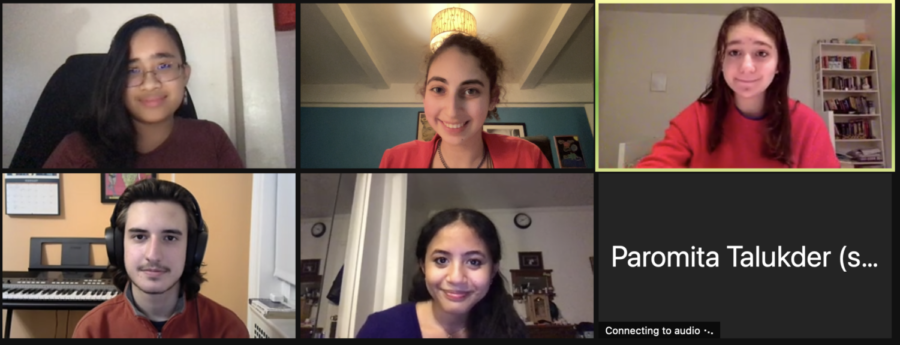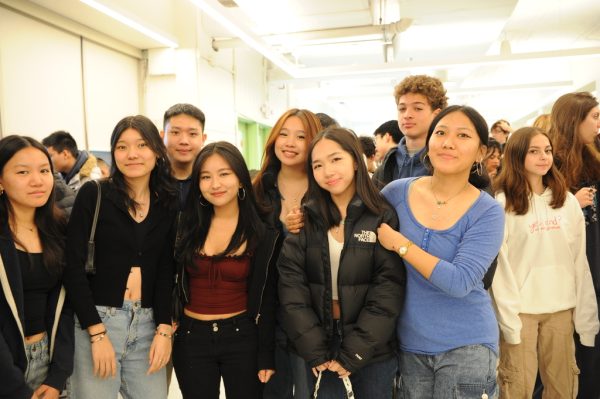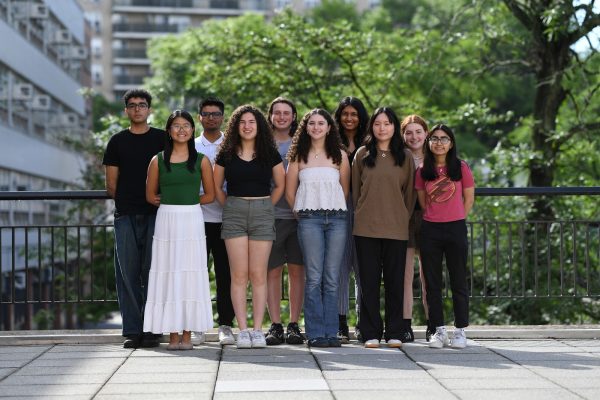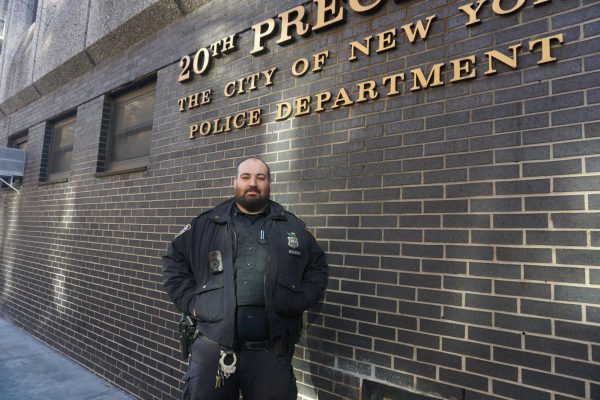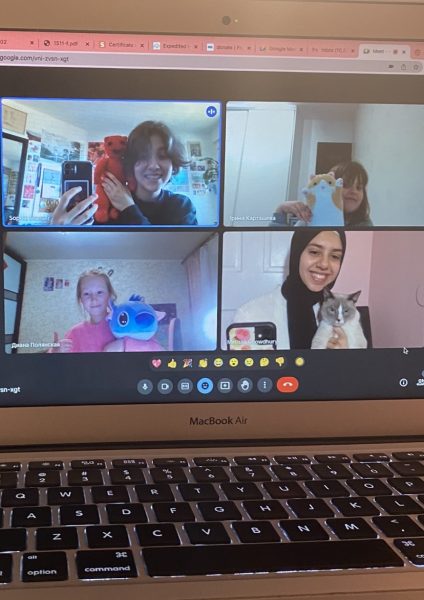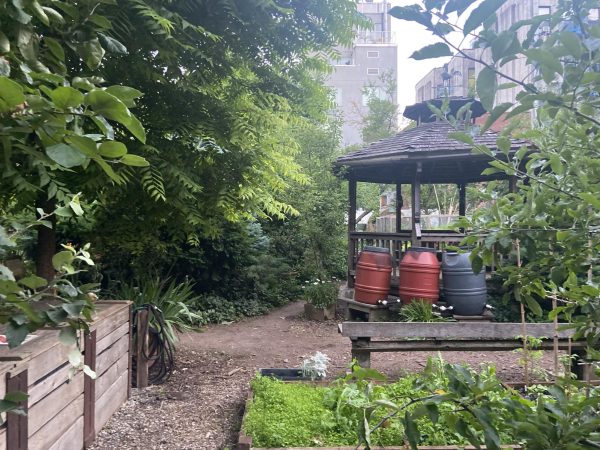April 2022 Advice Column: Tips on the College Process
The Copy Chiefs and an Editor-in-Chief of ‘The Science Survey’ are here to answer your questions about the college process.
Some of the Copy Chiefs of the 2021-2022 ‘Science Survey’ collaborate during a Zoom meeting after school. Pictured from left to right, top to bottom, are Katrina Tablang ’23, Maggie Schneider ’22, Katia Anastas ’23, Benjamin Fishbein ’22, Marian Caballo ’22 and Paromita Talukder ’22 (Not pictured: Sarah Derkach ’22).
Hey Bronx Science!
Do you hear the chirping of birds outside? See a dazzling display of newly budded flowers? Feel a calming breeze in the air? It must be the beginning of Spring, with its promises of warm weather and, for some, a cheerier second semester.
We, the Copy Chiefs and one Editor-in-Chief of The Science Survey, Bronx Science’s official newspaper, know that being a second semester junior can be the most stressful part of high school – it is why we decided to devote this edition of the Advice Column to answering all of your college-related queries. We’ve done the recommendation asking, the Common App writing and the college list compiling, and we hope that our words of wisdom can be of some comfort as you move through the next year.
9th and 10th graders, don’t worry. Many of these questions, while most urgent for our juniors, can be applicable to any Bronx Science student, regardless of grade level. And if you want to make a mental bookmark of our college advice for the future, well, we would be delighted.
With love,
Maggie Schneider ’22 (she/her), Paromita Talukder ’22 (she/her), Katia Anastas ’23 (she/her), Sarah Derkach ’22, Benjamin Fishbein ’22 (he/him), Katrina Tablang ’23 (she/her) and Marian Caballo ’22 (she/her)
How should I approach my teachers for help and advice?
Teachers don’t bite – at least at Bronx Science. Teachers want to educate, challenge, and help students grow into intellectually curious, resilient learners. Thus, the greatest barrier towards asking for help is our own perception that it might be embarrassing, inconvenient, or awkward. Despite this mental hurdle, asking for help is one of the greatest marks of a mature, driven student who recognizes that help from others is both a synonym for and a nudge towards helping yourself.
My advice: keep calm and go to SGI. SGI is your greatest friend and a perfect resource for help. Prepare specific questions surrounding homework, tests, or classwork to pose to your teachers. Identifying your own blind spots, misconceptions, or sources of confusion is key to receiving targeted help. Personally, my journeys to Physics SGI have greatly enriched my understanding of our first few units.
Additionally, repetition is important. If you are really struggling in a class, one SGI visit will not provide a magical antidote to your confusion; instead, make a conscious effort to repeatedly ask questions as soon as they surface. It may sound clichéd, but there are truly no bad questions.
Along with asking specific questions, requesting additional practice problems, online resources, or readings to aid your understanding of the content of a class is another way to approach a teacher for help.
The most important thing is to be a proactive and engaged learner. Your teachers want you to succeed. As a result, if you maintain an open line of communication with your teachers and ask questions, you will excel!
– Katia Anastas ’23
For college applications, how are you able to conclude whether early decision or regular decision is better?
The first thing that you should do is thoroughly understand what early decision (ED) and regular decision (RD) entail. Early decision is binding which means that if you get in, you must commit to that institution and withdraw your applications from all other colleges. You are also obligated to accept the financial aid that is offered to you but you may appeal if there are extenuating circumstances.
Because ED is binding, it also shows admissions officers that you consider their institution to be your top choice, which may increase your odds of being accepted. If you have more than one top choice, consider applying through early action (a non-binding early option) or RD.
Before you get too attached to a college and decide to apply via ED, make sure that you have done extensive research about the institution by talking to current students, admissions officers, alumni, watching student-made YouTube videos and visiting the campus if possible (virtual campus tours are also available for many colleges). Also note that some colleges, such as the University of Michigan, don’t even offer ED as an option, so make sure you double check your chosen institution does.
The last thing you want is to get accepted via ED and realize that you do not want to attend the institution. It is highly unlikely that you will be able to back out if you are accepted via ED so it is imperative that you discuss with your guidance counselor and parents before making a commitment. Additionally, the deadline for ED is usually a month before the deadline for RD which means you have less time to perfect your application.
If you want to be able to compare admissions and financial aid offers from various colleges, you are better off applying in the RD round. Many students have multiple top choices and want to be able to compare financial aid awards before committing. If this sounds appealing to you, and you prefer to have extra time to work on your application, RD might be a better option.
Pros of ED: slightly higher chance of acceptance; if accepted, you do not have to spend extra time on RD applications; smaller pool of applicants (though, arguably, more competitive).
Cons of ED: Less time to perfect application, binding may be too restrictive for some, student cannot back out of ED acceptance; students cannot see if they receive a better financial aid offer from other institutions.
Pros of RD: More time to work on application, students are able to compare admissions results/financial aid.
Cons of RD: Students do not receive the advantage of showing admissions officers that they are fully committed. There is also often a much larger pool of applicants.
These are just a few of the factors you should consider when deciding whether you should apply though ED or RD. Always try to consult with your guidance counselor, conduct your own research, and be aware of what’s important to you.
– Paromita Talukder ’22
How do I manage the college process beginning, with AP exams, tests, and SAT exams happening at the same time? I feel as though I do not have enough hours in my day.
The workload of the college process, APs, exams, and SAT studying all happening at the same time can definitely be stressful. It can be a cause for a lot of anxiety. But first I would keep in mind that everyone is going through the exact same process across the country. This is, for better or worse, a process that every high school student must experience. Keep in mind that it is preparing you for the workload of college and an adult life, and that you will be better for it. The three steps I use to manage the stress and workload are scheduling in advance, allocating my time for priorities, and leaving time for myself.
Scheduling in advance is vital to not overloading your schedule beyond your capabilities. Try looking a couple months in advance, especially when picking courses, and imagine yourself completing those workloads. This means sending e-mails and/or speaking directly to teachers who offer the classes or students who have taken those classes before and ask about the workload. Students often forget that the college process is like its own class. It’s important to take into account the number of hours a week you will be spending on writing supplements, editing your common application essay, and even just filling out general information. These tasks seem easy enough, but when you combine that with school work as well as commuting and other activities, you will find that you have little to no time for yourself.
Allocating time for priorities may seem tedious, but it is crucial to managing your work. Time management is a skill that everyone needs, especially high school students going through the college process. There are tons of different apps, planners, and methods to help you to manage your time. With the help of different aids, you can block off select times for your school work and college work. I personally use my Bronx Science planner religiously. I always write down my assignments and the approximate amount of time they will take up. That way, I know when I need to start my work and if I have time for any other plans. I would advise doing something similar – allocating time to the most important tasks you have that day. Sometimes, you will have more work than can fit in a few hours. In these cases, I would prioritize specific assignments/work that NEEDS to get done that day. The rest can be finished at a later time and/or explained to a teacher – they will be very understanding and will most likely grant you an extension if you really do need it.
Lastly, leaving time for yourself is arguably the most important step. A lot of students, especially those going through the college process at Bronx Science, will often say that they don’t need time for themselves and they can manage the workload. However, the reality is that we burn out when we don’t get periodic breaks. If you don’t leave time for yourself, you may find the exhaustion of all the work catch up to you, until you no longer feel you have control over your workload. Even if it is just an hour to nap or engage in a hobby, your brain needs a break from constant stimulation. I try to take small breaks more frequently which works for keeping me focused. Some people are able to go for hours doing assignments and then take a longer break until moving on to the next task. Find what works for you, but make sure you leave time to recharge.
– Sarah Derkach ’22
How can we develop stronger relationships with our guidance counselors?
It may seem daunting at first, but the first step to developing any relationship is to take the initiative and reach out! Guidance counselors are here to help you and will do their best to accommodate you. Because they are responsible for so many students, it is up to you to approach them outside of the required meetings. Scheduling a meeting is as easy as sending them an e-mail.
Remember — guidance counselors are available to help you in a variety of ways, including offering insight into course selection, the college process, and general advice, so there really is no shortage of reasons to see your counselor. Go into meetings with an open mind and listen to what they have to say. If you have questions, ask them! Demonstrating a willingness to maintain an open line of communication is a great step toward building a better relationship with your counselor. The more you interact with them, the more opportunities you’ll have to get to know them on a more personal level.
Ultimately, getting to know your guidance counselor is just like getting to know any other person — you can’t read each other’s minds, so don’t hesitate to speak candidly and show them who you are. They have a wealth of wisdom to offer, so make sure to take advantage of your access to it while you have the chance!
– Katrina Tablang ’23
How important are extracurricular activities to colleges? What happens if you do not have many of them?
I would say that it is not so much the number of extracurricular activities that you do that are important to colleges, but rather how much you commit to them and how they demonstrate your interests or strengths. As college admissions become more and more competitive — and as metrics like testing increasingly become less relevant – a big part of your application is the story it tells. Admissions officers want to be able to put you in a box or assign you some easy label, and they want all of your extracurriculars and supporting information to support that story.
So, being in a million different extracurriculars that have little to do with each other isn’t going to be the most useful thing, and it will probably end up wasting your time and energy. This is especially true because if you are doing too many extracurriculars, you’re probably not going to be able to take up a leadership position or have meaningful engagement with any of them.
Instead, I would recommend sticking to a few extracurriculars that are easily related to each other and complement the character that you want to present yourself as to admissions officers. I would also try to be in leadership positions or in some way have accomplishments to show for each of them.
For example, when I applied to schools, I wanted to highlight my interests in history and journalism but also how those interests were shaped by me being at a STEM-dominated school. So I mentioned being president of the History Club, being an editor of The Science Survey and the work I’ve done for other publications, as well as my social science research project. But I did not, for example, talk too much about my involvement on the Model UN team, because even though it was a meaningful part of my high school experience, I’m not on the leadership, didn’t commit to the team as much as I committed to other extracurriculars, and didn’t want admissions officers to focus on that aspect of me. Instead, I wanted to showcase the more academic side of my interests.
This is not to say you can’t pursue an activity just because it doesn’t align with your other interests! I’ve been playing music for a very long time, playing both the piano and clarinet, and by no means would I suggest dropping something like that. In fact I mentioned music in my applications, albeit briefly. However, I would say not to pick up any new activities just because you think they will be useful for college if they do not align with your interests or previous extracurriculars. Colleges want to see depth of interest and sustained pursuits; they do not want to see you all of a sudden joining 10 unrelated clubs halfway through your junior year.
So to sum up, extracurriculars do definitely matter, but in my opinion, it is about quality over quantity.
– Benjamin Fishbein ’22
For colleges, how much should I believe in myself, and how much should I be realistic?
The most important thing I’ve learned from the college application process is that there is no overarching logic to it all. People who I thought were shoo-ins ins at a college were rejected and those who I viewed as less intellectually motivated were accepted to the same institution. You will drive yourself crazy trying to figure out which places you and your peers will and should get into.
Considering this, I would say to not adopt any kind of fixed mindset about the process, and that includes believing in yourself or being realistic. Don’t expect anything – I mean that in a positive way. Don’t expect rejections and don’t expect acceptances. Instead, just keep an open mind. There’s very little use in trying to prepare yourself for the result, because you don’t know how you’ll feel at that moment until you’ve reached it.
As your guidance counselor will probably tell you many times over the course of this year, you, and everybody else, need to have a balanced college list because there is so much unpredictability. If you find a few safeties that you love, there won’t be as much of a need to be constantly weighing your chances. The college process is a gamble, but you shouldn’t be dependent on the roll of the dice.
With that being said, however, don’t avoid applying to a very prestigious school because you think it’s a lost cause. If you love Harvard, apply to Harvard! I wouldn’t say to “believe in yourself” in that you assume you will get in, but you should believe in the strength of your candidacy and the extent of your dreams. There’s no harm in reaching for the stars a little.
Happy hunting!
– Maggie Schneider ’22
How do you pick which teachers to ask for letters of recommendation and raves?
Selecting who you want to write your college letters of recommendation can be difficult, but it is an important decision! Recommendation letters serve as an opportunity for colleges to get an additional glimpse of who you are beyond your numbers: how you work as a student, how you engage in the classroom, and what you’re like with your peers. You should select teachers who can vouch for your strengths, your growth, and your potential to thrive in a rigorous college environment.
Most colleges require both STEM and humanities recommendation letters, so your guidance counselors will recommend you pick one from each field. It’s also preferable to have recommendations from teachers in core classes, as well as teachers who taught you in your junior year. These will be the instructors who are most familiar with your current academic abilities and work ethic. Some of my friends selected teachers who’ve had them for multiple years. Ask whoever knows you best!
Raves are a little bit different than full letters of recommendation, and they carry less weight. They’re given to your guidance counselor to help them craft your counselor recommendation. This is a great opportunity for your sophomore year teacher (who maybe advises your club!) to speak to your leadership abilities; or for that other STEM teacher you love to talk about your secondary passion for coding. Try to think about who can shed light on different facets of who you are. You’re also welcome to ask mentors from outside of school to submit raves to your counselor (through e-mail) as well.
It’s important to note that the teachers you end up asking for letters of recommendation and raves do not have to be from the classes that you have the highest grades in. You may have a 99 in AP Statistics, but if you went to all of your Pre-calculus teacher’s SGIs and know they would write you a more compelling recommendation, choose them — even if you have a lower grade. Colleges already know what your grades and extracurriculars are. The question is: Who are you?
Some juniors also worry that they don’t have any teachers that know them well. “Do I still have time?”
Yes! Continue working hard in your classes, actively participating, and attending SGI sessions. If you’re on the shy side (like me), still try to do all of the above, but don’t fret. Many teachers ask that you answer questionnaire forms. Always ask if they need additional information and offer up a document with your class reflections and memorable anecdotes.
Some schools also allow for a third letter of recommendation. If you’re in the Bronx Science research program, this a great opportunity to have your research mentors vouch for you, so don’t forget to ask them soon too!
– Marian Caballo ’22
We, the Copy Chiefs and one Editor-in-Chief of The Science Survey, Bronx Science’s official newspaper, know that being a second semester junior can be the most stressful part of high school – it is why we decided to devote this edition of the Advice Column to answering all your college-related queries.
Maggie Schneider is an Editor-in-Chief of ‘The Science Survey.’ She loves journalistic writing because it is a recognition of the infinite number of...
Marian Caballo is a Copy Chief for ‘The Science Survey,’ and she is elated to be on staff for a second year. She is drawn to journalism because it...
Benjamin Fishbein is a Copy Chief for ‘The Science Survey.' He believes that a diverse range of ideas within journalism is important as it fosters thoughtful...
Paromita Talukder is a Copy Chief for ‘The Science Survey’ where she explores topics ranging from online activism to clubs at Bronx Science. She sees...
Katia Anastas is an Editor in Chief for ‘The Science Survey.’ She loves that journalistic writing equally emphasizes creativity and truth, while allowing...
Sarah Derkach is a Copy Chief for ‘The Science Survey,' reviewing articles written by students from each subsection of the newspaper. She enjoys the...
Katrina Tablang is a Copy Chief for 'The Science Survey.' She enjoys journalistic writing because it enables her to explore a wide variety of perspectives...

